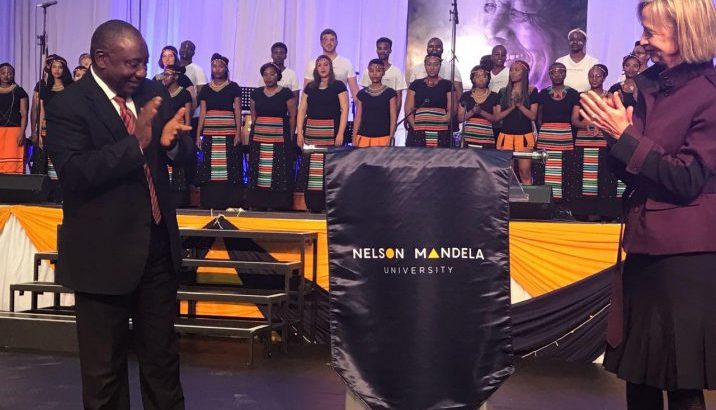África/Julio de 2017/Fuente: The Citizen
Resumen:
El lanzamiento de la Universidad Nelson Mandela se llevó a cabo en el campus de la Universidad Missionvale y fue asistida por un número de dignatarios, entre ellos el ex jefe de Justicia, Dikgang Moseneke, que se dice que es una fuerza clave en el cambio de nombre de la institución de la antigua Universidad Metropolitana Nelson Mandela.
El mensaje de Moseneke era claro: «La honestidad importa, la integridad importa, coloca a la gente en el centro de lo que haces y defiendes el nombre».
El nombre de la universidad fue enmendado el 23 de junio en la Gaceta del Gobierno por el Ministro de Educación Superior y la Hoja de Capacitación Nzimande.
Nelson Mandela University has big shoes to fill and expectations to meet after it was officially renamed after the iconic late statesman on Thursday, at a launch attended by guests which included South Africa Deputy President Cyril Ramaphosa and prominent human rights lawyer and Mandela friend, Advocate George Bizos.
The launch was held at the university’s Missionvale Campus and was attended by a number of other dignitaries, including former deputy Chief Justice, Dikgang Moseneke, who was said to be a key force in the renaming of the institution from the former Nelson Mandela Metropolitan University.
Moseneke’s message was clear: “Honesty matters, integrity matters, put the people at the centre of what you do and defend the name.”
The university’s name was amended on June 23 in the Government Gazette by Minister for Higher Education and Training Blade Nzimande.
The idea for the name change was born seven years ago and the institution has aimed to revolutionise the way the university functions, while at the same time striving to live up to Madiba’s values and legacy.
“In naming this university after Nelson Mandela, you are shouldering a great responsibility – to encourage, educate and nurture the new generation about which Madiba wrote. You are shouldering the responsibility to giving life to Madiba’s dream of social equality,” said Ramaphosa in his address.
Ramaphosa called for the decolinisation of the higher education system, adding that the university had a duty to stand up to defend principles of non-racialism and non-sexism.
He said that it was a daunting task to take on a name of an iconic figure and in the end Nelson Mandela University would be expected to be better than all other 25 universities in the country, to make a greater contribution towards building the nation.
“This university must be at the forefront of efforts to ensure that higher education is an instrument for the achievement of social equality- that it does not simply perpetuate privilege.
“While we have made huge strides in making higher education accessible, many capable and deserving young people are still not able to enter universities. Many study in substandard living conditions, the support they receive is not sufficient and too many drop out. These are the challenges that a university named after Nelson Mandela will have to confront,” he said.
The Deputy President further congratulated university council chair, Justice Ronnie Pillay, who indicated that the university’s financial aid contributions had risen significantly from R250 million in 2008 to R600 million in 2016.
Representing the youth, SRC representative, Petro Mzileni, called for Nelson Mandela University to gain an intellectual identity and platforms to allow educational transformation.
In a fiery address, Mzileni came across strongly in saying that students were inspired by the “radical Madiba” which had enabled them to fight for free education.
“There is a tendency of distancing Mandela from his liberation movement, we are saying embrace Madiba for who he was, embrace his legacy! There must be free education and as students we are inspired by the young radical Madiba who allows us to fight for the fees commission report and the clearance of student debt,” he said.
Mzileni was praised by Ramaphosa and Bizos for his passionate address.
Meanwhile, Nelson Mandela University Chancellor, Santie Botha, in her address was scathing towards the” integrity and skills set” of the current political leadership tasked to achieve Madiba’s dream of a prosperous country, respected on a global map.
“Would Madiba be proud? Personally, I very much doubt it, that is the question the current political leadership should ask themselves today. The time, I believe, has come to re-brand South Africa, not in name, but in values and delivery. The values of a re-united and re-launched South Africa which reflect integrity, honesty, delivery for all its people and not just a select few, eradication of all forms of corruption underpinned by a world-class primary, secondary and tertiary education system,” said Botha.
Human rights lawyer and friend of Madiba, George Bizos, fondly recalled the day he met Mandela in 1948 and reminded the crowd how Mandela suffered in his quest to obtain his law degree.
“Mandela was told that advocacy was not for black people, he had to face applications for his disbarment. I get angry when people say Mandela let black people down…he avoided what could have been a civil war.A fundamental change came in 1990 and Mandela played a role in constitutional benefit for all.
“This name is an honour and he would have been proud,” said Bizos.







 Users Today : 41
Users Today : 41 Total Users : 35460058
Total Users : 35460058 Views Today : 57
Views Today : 57 Total views : 3418688
Total views : 3418688